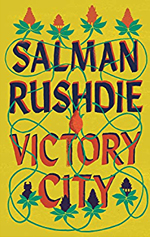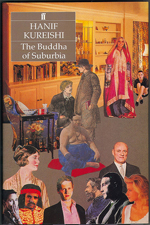Two British Asian writers have been in the news lately, both for unfortunate reasons. The first, of course, is Salman Rushdie, of whom I wrote in August last year, shortly after he was attacked and stabbed at a book reading in the United States. The other is his friend Hanif Kureishi, who fell in Rome at the end of last year, rendering him paralysed in hospital.
Rushdie has lost the sight in his right eye and the use of a hand following the attack, which left him with serious wounds to his neck, severing the nerves in his arm, as well as many further wounds in his chest and torso. He speaks about the results of the attack in this article. Yet the author, who initially made his name with the Booker Prize winning Midnight’s Children, before achieving unwanted notoriety with The Satanic Verses, has just published his latest novel, Victory City.
 This review of the new book suggests that Rushdie has lost none of his power to entertain, but also to question. It is a novel, suggests Martin Chilton, ‘that keeps asking: what is the nature of history and what is a human life?’ As he goes on to say, Rushdie ‘has long wrestled with arguments about reason and religion, creating nuanced stories in a world where complicated answers are not always welcome.’ Of course such issues are at the heart of The Satanic Verses, and the new novel’s use of magical realism and the mythology of India recalls Midnight’s Children, a novel which was elected as the Booker of Bookers in 2008.
This review of the new book suggests that Rushdie has lost none of his power to entertain, but also to question. It is a novel, suggests Martin Chilton, ‘that keeps asking: what is the nature of history and what is a human life?’ As he goes on to say, Rushdie ‘has long wrestled with arguments about reason and religion, creating nuanced stories in a world where complicated answers are not always welcome.’ Of course such issues are at the heart of The Satanic Verses, and the new novel’s use of magical realism and the mythology of India recalls Midnight’s Children, a novel which was elected as the Booker of Bookers in 2008.
Rushdie, then, has done more than his fair share of endurance. He has been lending his support to Hanif Kureishi as he is treated in the hospital in Rome:
My friend Salman Rushdie, one of the bravest men I know, a man who has stood up to the most evil form of Islamofascism, writes to me every single day, encouraging patience. He should know. He gives me courage.
 That tribute comes from one of Kureishi’s posts from hospital. He cannot hold a pen, so has to be assisted in this task by his son and wife. The difficulties he faces are very clear when he says ‘I sat on the bed, with my feet on the floor, staring ahead of me. I have to say, I felt proud and amazed’. Yet Kureishi’s work is often marked by a mischievous humour, and this remains true in some of his recovery writing. ‘Since I became a vegetable, I have never been so busy,’ he said, for example. Publisher and writer Robert McCrum notes this tendency in Kureishi’s work:
That tribute comes from one of Kureishi’s posts from hospital. He cannot hold a pen, so has to be assisted in this task by his son and wife. The difficulties he faces are very clear when he says ‘I sat on the bed, with my feet on the floor, staring ahead of me. I have to say, I felt proud and amazed’. Yet Kureishi’s work is often marked by a mischievous humour, and this remains true in some of his recovery writing. ‘Since I became a vegetable, I have never been so busy,’ he said, for example. Publisher and writer Robert McCrum notes this tendency in Kureishi’s work:
He loves to make mischief, but I think his greatest achievement is that he is both very serious and very funny, a committed artist and a great entertainer. In my experience, it is very rare for a writer to achieve both high and low acclaim.
Read more in this article.
Known for the film My Beautiful Laundrette as well as novels such as The Buddha of Suburbia, The Black Album, Intimacy and What Happened?, Kureishi has had a significant impact. In this article, he talks about the literary texts which have inspired him, which include Tom Sawyer, To Sir With Love and The Catcher in the Rye.
Further reading:
Salman Rushdie’s website.
Hanif Kureishi British Library page.